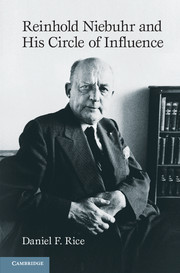Book contents
- Frontmatter
- Contents
- Acknowledgments
- Introduction
- Chapter 1 Paul Tillich (1886–1965)
- Chapter 2 John Dewey (1859–1952)
- Chapter 3 Norman Thomas (1884–1968)
- Chapter 4 Arthur Schlesinger Jr. (1917–2007)
- Chapter 5 Hans Morgenthau (1904–1980)
- Chapter 6 George Kennan (1904–2005)
- Chapter 7 Felix Frankfurter (1882–1965)
- Afterword
- Index
- References
Chapter 3 - Norman Thomas (1884–1968)
Published online by Cambridge University Press: 05 November 2012
- Frontmatter
- Contents
- Acknowledgments
- Introduction
- Chapter 1 Paul Tillich (1886–1965)
- Chapter 2 John Dewey (1859–1952)
- Chapter 3 Norman Thomas (1884–1968)
- Chapter 4 Arthur Schlesinger Jr. (1917–2007)
- Chapter 5 Hans Morgenthau (1904–1980)
- Chapter 6 George Kennan (1904–2005)
- Chapter 7 Felix Frankfurter (1882–1965)
- Afterword
- Index
- References
Summary
Reinhold Niebuhr met Norman Thomas when Niebuhr got involved in socialist politics after moving to New York City in 1928. His association with Thomas and The World Tomorrow staff began immediately by way of his joint appointment, financed by Sherwood Eddy, to a part-time teaching position at Union Theological Seminary and to an associate editing position at The World Tomorrow. As for what first prompted the social awareness resulting in his attraction to Thomas, Niebuhr informed us in his 1954 oral interview at Columbia University that his experiences as a pastor in Detroit with “raw politics” associated with Henry Ford are what sharpened his mind to “all the facts of life in regard to our industrial society.” He further recalled 1926 as the year when he “had come out with a socialistic answer to the problems of modern industrialism.”
Thomas had begun moving closer to accepting the general socialist critique of capitalism during the period of World War I. His embrace of socialism also grew out of experiences gained after graduating from Princeton University, first at the Spring Street Presbyterian Church in New York City in 1905, next as an assistant at Christ Church on West 36th Street in 1908, and then after his ordination in 1911 at the East Harlem Presbyterian Church. While a student at Union Theological Seminary, Thomas, like Niebuhr later, came under the influence of Walter Rauschenbusch, whose books Christianity and the Social Crisis and Christianizing the Social Order ignited social consciousness within Protestant religious circles. As Thomas recalled, however, his embrace of socialism came primarily as a matter of “events, not people and not books” – events relating to the “grotesque inequalities, conspicuous waste, gross exploitation, and unnecessary poverty all about me.”
- Type
- Chapter
- Information
- Reinhold Niebuhr and His Circle of Influence , pp. 80 - 112Publisher: Cambridge University PressPrint publication year: 2012



